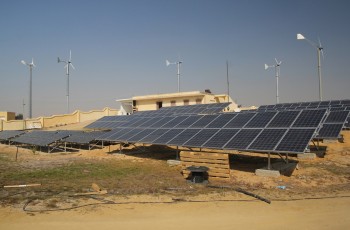juwi Brings Clean Energy and Water Into the Egyptian Desert
 Temperatures way above 40 degree Celsius and desert as far as the eye can see. In the middle of this wasteland of yellow dunes, halfway between Cairo and Alexandria, lies Wadi El-Natrun: A green oasis where tomato bushes, olive trees and date shrubs grow. Piece by piece busy farmers reclaim fertile farmland from the desert – also with help from the juwi group. The German specialist for renewable energies has successfully implemented another Off- Grid project. A combination of wind and solar power generates enough clean electricity for driving several water pumps and a desalination plant. A battery storage of around 500 kilowatt (KW) hour ensures that groundwater can be extracted around the clock for watering the wadi’s fields. The project has been put out for tender by the University of Alexandria. In Wadi El-Natrun the university researches how scanty soil can become accessible for agriculture. It is juwi’s first project in Egypt.
Temperatures way above 40 degree Celsius and desert as far as the eye can see. In the middle of this wasteland of yellow dunes, halfway between Cairo and Alexandria, lies Wadi El-Natrun: A green oasis where tomato bushes, olive trees and date shrubs grow. Piece by piece busy farmers reclaim fertile farmland from the desert – also with help from the juwi group. The German specialist for renewable energies has successfully implemented another Off- Grid project. A combination of wind and solar power generates enough clean electricity for driving several water pumps and a desalination plant. A battery storage of around 500 kilowatt (KW) hour ensures that groundwater can be extracted around the clock for watering the wadi’s fields. The project has been put out for tender by the University of Alexandria. In Wadi El-Natrun the university researches how scanty soil can become accessible for agriculture. It is juwi’s first project in Egypt.
Constructing the project was no easy task. The entire technical equipment as well as the PV modules and inverters had to be transported from Wörrstadt to Wadi El-Natrun in five freight containers. The four small wind turbines with a capacity of 12 kilowatts each were delivered separately from the Netherlands. juwi set up the 50 KW photovoltaic power plant, the wind turbines as well as the battery storage together with an electronics company from Alexandria in only two weeks’ time. Fabian Jochen, Head of juwi’s Off-Grid section: ‘Putting the system into operation after two weeks of hard work was an emotional moment. In the middle of the night, in the headlight of a pick-up truck, we activated the pumps for the very first time – and the water welted.’
Jochem’s colleague Norbert Borchert adds: ‘We haven’t just brought water into the desert, we have also transferred our know-how to people who can directly apply the knowledge. For this reason alone it was worth pursuing the project’. Thanks to the new hybrid system the old diesel generator has become obsolete. That is good news for the environment and additionally saves fuel costs. ‘The diesel generator wasn’t just old but also extremely noisy, dirty and required extensive maintenance’, Borchert further explains.
The hybrid system is monitored and steered via a remote control system. Using GSM remote monitoring the solar plant can be controlled on the internet from Germany. That way possible faults can be detected in real time and be sorted out immediately by local electricity companies.
With many years of international experience, juwi’s Off-Grid department brings clean energy to remote areas without access to the public power supply system. In 2011, in the small town of Tsumkwe in northern Namibia for example, juwi built one of Africa’s largest solar-hybrid systems. Thanks to the new plant, the small town now has a clean and stable power supply throughout the year for all public buildings and for about 100 households.
For more Information, please visit: www.juwi.com
News Categories
- » NEWS HOME
- » Automation & Robotics
- » Industry 4.0
- » Material Handling
- » Sensors
- » Quality & Testing
- » Machine Vision
- » Laser & Optics
- » Metalworking
- » Motion Control & Drives
- » Hydraulics & Pneumatics
- » Process Industry
- » Renewable Energy
- » Agriculture
- » Home & Office Furniture
- » Environmental Tech



